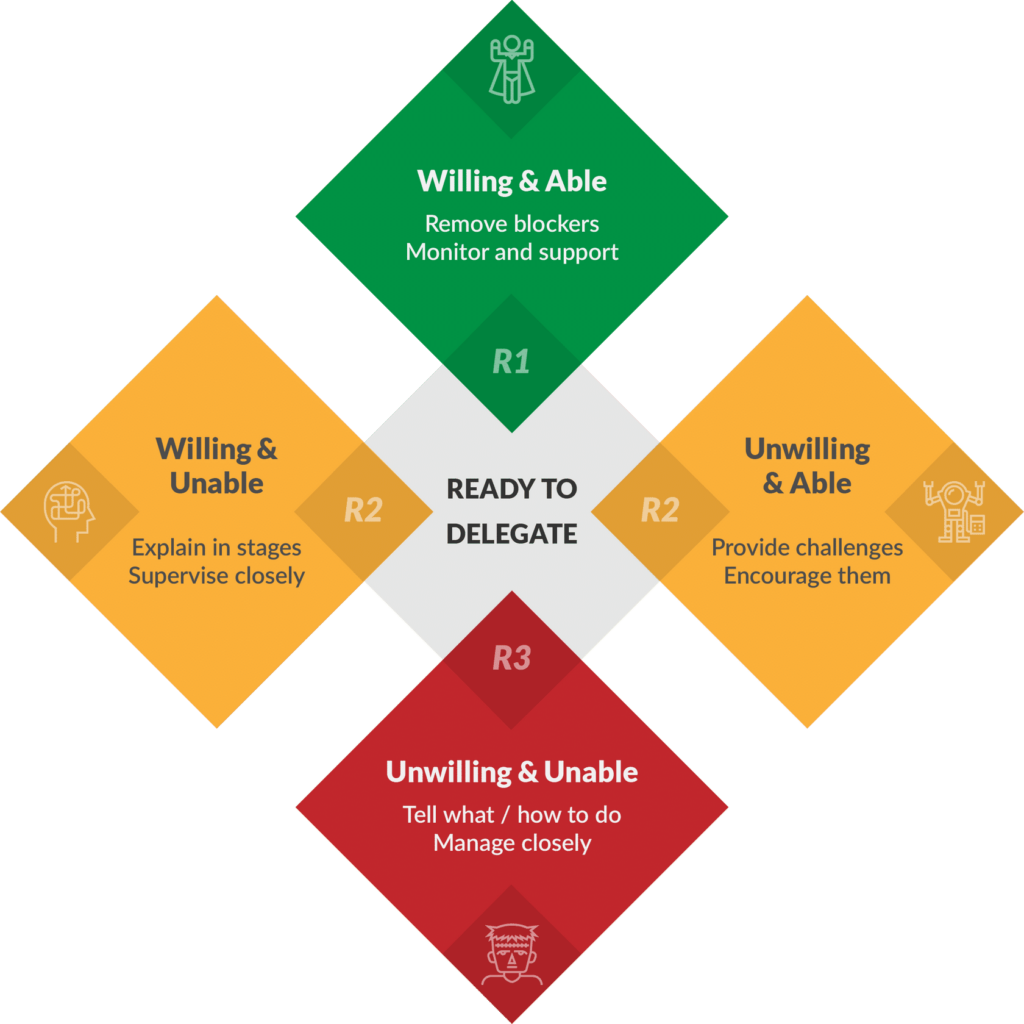Skill and will
As a project manager, you will regularly need to delegate tasks.
Among other things, the project plan documents how those tasks are broken down, scheduled, and resourced, but how do you know your team can actually deliver?
Having delegated the work, how often do you need to intervene?
That all depends on the person’s readiness (R) for delegation.
Readiness is a function of their willingness and ability (skill) to make a decision or perform a task.

Willing & able
Ballistic – set and forget – delegation is only appropriate for people who are both willing and able to meet your expectations.
Ok, forget is a bit extreme; you should always observe and monitor their effort.
Nevertheless, a project team member at this stage of readiness is the least of your worries, and the bulk of your attention and intervention should be directed elsewhere.
Willing & unable
Rather than directing a person who is unable but willing, you should explain the process to them in detail, and again supervise them closely.
Signs someone is unable to complete a task might include errors in their output, incomplete work or dissatisfied stakeholders.
Other responses might therefore include giving them more time to work, providing mentoring or formal training, and having them reflect on their work for lessons learned.
Because they are willing to have a go, you should harness their enthusiasm, while ensuring they do not step outside the parameters of the job.
Unwilling & able
Occasionally, you will encounter a person who is able but unwilling to accept delegated responsibility.
Unwillingness will often manifest in avoiding the task or decision altogether and may be because they feel overworked, underpaid, resent the task, or just resent you – it could be any combination of several reasons.
Ideally, you should identify the source of their unwillingness and address it directly, but this may not always be practical or possible.
For example, you may not have the budget to address their perceived pay deficit, but they keep showing up to work anyway.
Either way, you should provide encouragement and regular positive or constructive feedback on their performance and look to challenge their potentially under-utilized skills in new and interesting ways.
Unwilling & unable
A person who is unable and unwilling is said to have a very low state of readiness for delegation – ideally, you should not be delegating to this team member at all.
Nonetheless, if it is a requirement of the project or a legacy of the team you have inherited, you should give this individual very clear and detailed direction on what is required and manage them closely throughout.
That said, a person will inevitably have multiple, simultaneous states of readiness that depend on the circumstances of the project and the tasks assigned to them.
Willingness especially can fluctuate from day to day and often due to factors that are well outside your control.
The project manager’s skill lies in being alert to and recognising these often subtle variations and contextualising their response appropriately.
Hills
Skill and will refer to a person’s readiness for delegation, but what hills (or barriers) might we unintentionally place in the way of their performance?
If someone fails to complete a delegated task, it may not have anything to do with their readiness or competence – it may instead be a failure of our management.
Common management causes of poor task performance include:
- Poor / vague / inadequate instructions (scope)
- Unclear task priorities
- Insufficient time
- Insufficient resources
- No context for work – why am I doing this; how does it benefit others?
- Mismatched management style (eg micro-managing willing and able team members)
- Slow feedback / decisions
- Red tape – too much project management!
This is otherwise known as setting people up for failure!
You should, therefore, be conscious when evaluating task and team performance of the influence and impact of your delegation decisions.




